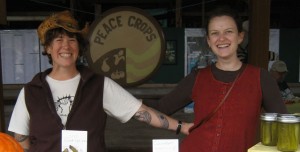 Good news: I won a scholarship to the Stone Barn Center‘s 2011 Young Farmer’s Conference to be held at the center, 45 minutes outside of Manhattan, December 1 and 2. The conference will have representation from 17 states in the union and cover topics from compost to animal husbandry to financial planning for your farm to the ergonomics of farm chores. It’s a power packed two days of information.
Good news: I won a scholarship to the Stone Barn Center‘s 2011 Young Farmer’s Conference to be held at the center, 45 minutes outside of Manhattan, December 1 and 2. The conference will have representation from 17 states in the union and cover topics from compost to animal husbandry to financial planning for your farm to the ergonomics of farm chores. It’s a power packed two days of information.
I applied for this scholarship on a last minute whim, certain that I wouldn’t get it. It was two days before the application deadline and I had just found out about it. Additionally, I tend to feel under-qualified for most things I attempt to do. I suppose it has a lot to do with being a perfectionist and feeling like it’s going to take more knowledge than I currently possess to do things perfectly. But apparently my insane work schedule over the last few months made me perfectly qualified for this conference.
This summer I spent 24 hours a week working with farmer Ginger Salkowsky at her off-the-grid organic vegetable farm, R-evolution Gardens. She grows for her CSA members as well as to sell at the Cannon Beach and Manzanita Farmers’ Market. Unofficially I tagged along with Ginger helping her with projects around the farm as early February, but by April she had me and another half-time intern working like crazy; seeding, up-potting, planting, preparing beds in the field, protecting beds from the weather, feeding, cleaning, and moving her flock of chickens across the property as we geared up for the first vegetable deliveries and sales of the season in the beginning of June. It was one wild summer. We had a bacterial blight that wiped out hundreds of plants in the spring, lots of rain and cold. Too much, it turned out, for some of the plants to handle. But Ginger kept us all moving in the right direction and we worked on lots of things that like to grow in our cooler wetter climes: salad greens, kale and chard were abundant. It didn’t seem long at all before beets, carrots, and radishes were in constant supply. To keep surprising our family share holders, Ginger (with our help) grew romanescos, kohlrabi and rapini and managed hot weather delights like tomatoes and melons in her three hoophouses. Over the summer the farm turned out constant supplies of locally grown, beautiful heirloom variety produce. It was so beautiful that tourists at the Friday market in Manzanita would patiently hover over shoulders and between the elbows of our eager customers with their cameras snapping shots of the produce display. We had pink and red radishes, rainbow carrots, rainbow chard, Japanese egglplants, lush basil leaves, and wildflower bunches for sale. I worked hard, ate well, and learned an incredible amount about farming. I balanced this farm apprenticeship with a part time job at a local nonprofit, volunteer involvement with Food Roots, and weekends spent weeding, harvesting, and selling the vegetables Fletch and I have managed to grow—about 1,000 pounds of food all told.
Now that I stop to write about it, it turns out that I am quite the qualified candidate for a scholarship to this very exciting and information-packed conference in December. The scholarship covers room and board as well as my registration fee. The only difficulty of spending more than half of my time this summer working for information rather than cash pay is the cost of buying a plane ticket from Portland to New York and back.
While Fletch is thrilled that I won the scholarship, and also a little jealous, we’ve been working very hard to balance our bank books, and I promised him that I will not go unless I can fundraise the ticket, which will cost about $400. Recently we sold $140 dollars worth of produce to a local restaurant, Art Space in Bay City. As I wandered around the gallery looking at a photo exhibit, I spotted myself in soft focus behind a beautiful display of farmers’ market produce in one of the photos. That same day we bought $60 worth of strawberry plants and stuck ’em in the ground. We are trying to reinvest our farm revenue back into our future ventures, so that leaves $80 to put toward a ticket, plus $20 that a friend from Food Roots has pledged. Would you, dear readers, be interested in becoming a small-time slow-money investor (named after the slow-food movement and meaning people who invest in small, sustainable, slow food ventures) by donating to send me to a farm conference? I have $300 more to find, and every little bit helps. If you’d like to donate, email me and I will get you some options on the easiest way to do it. Peace Crops thanks you!

